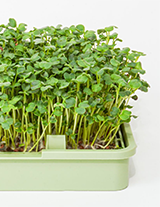
Sprouts and microplants are true nutritional sources due to their increased amount of vitamins and minerals.
Vitamins
The amount of several vitamins increases during sprouting. Vitamin B helps break down carbohydrates, fats and proteins.
Folate helps create new cells and red blood cells. This vitamin is particularly important during body growth and pregnancy.
Even vitamin A levels increase when seeds germinate.
Specifically, it is carotene that gets the boost. Carotene is a substance that the body can convert into vitamin A. It is vital for the proper functioning of vision, skin and mucous membranes. It is also essential for the development of the fetus.
As for vitamin C, most seeds don't have it from the start, but it develops during germination. In research focusing on buckwheat and quinoa seeds, which contain no vitamin C at all, it was shown that after two to three days of germination, vitamin C levels reached 24 milligrams per 100 grams of germ. For reference, the recommended daily amount of vitamin C is 75 milligrams. This vitamin acts as an antioxidant in the body and helps build cartilage and bone tissue.
Even vitamin E levels increase during sprouting. This vitamin acts as an antioxidant and protects our body tissues, among other things.
Here are some examples of sprouts and microplants that contain high amounts of vitamins important for energy metabolism and nervous system health:
- Vitamin C: Broccoli sprouts, alfalfa sprouts and mustard sprouts are rich sources of vitamin C. This vitamin is important for the immune system and helps iron absorption.
- Vitamin A: Mung bean sprouts are excellent sources of vitamin A. This vitamin is important for eye and skin health.
- Vitamin K: Broccoli, alfalfa and cabbage sprouts are good sources of vitamin K. This vitamin is important for blood clotting and bone health.
- B-complex vitamins: Mung bean sprouts, corn and oat sprouts are rich sources of B-complex vitamins such as thiamin, riboflavin, niacin and folic acid.
However, sprouts can't give us much when it comes to vitamin B12. This is a vitamin that we must acquire from the animal kingdom. Vegans need to take special care to get vitamin B12 supplements.
The misunderstanding that sprouts are rich in vitamin B12 stems from the fact that bacteria produce this vitamin and bacteria can grow on sprouts. But this is not something we want to happen, because then we risk increasing the bacteria levels as well. In this sense following the growing advice and using Babylon Garden seeds exclusively is very important to prevent bacteria from forming. These are easy to spot, through the grey downy webbing and unpleasant smell.
If you encounter such problems, discard the seeds from the Ishtar tray and then clean the container and grid thoroughly.
Minerals
Seeds contain several types of minerals such as iron, magnesium, zinc and calcium. Phytic acid binds the minerals to the seeds and makes it difficult to absorb them. During germination, phosphorus is released from the phytic acid molecule to provide the phosphorus requirements of germinating seeds.
The more phosphorus released, the more the phytic acid blocks the action of the other minerals. So now the minerals become easier for the plant to use and easier for us to absorb as we eat the sprouts. Isn't nature fantastic ?
Minerals help different types of processes in the body. Although we don't need large amounts of them, they are still vital for us.
Fibre
Dietary fibre is mainly found in vegetables, they are soluble or insoluble. Think about how oats behave when we make flakes or what happens when linseed is mixed with hot water. Pectin in fruit is an example of a soluble fibre.
An example of insoluble fibre is the husk that surrounds various types of seeds. Soluble and insoluble fibres can co-exist in different amounts in the same food.
Through germination, the amount of soluble fibre increases somewhat, while the amount of insoluble fibre decreases. In general, fibre levels increase.
Both soluble and insoluble fibres add bulk to food. Soluble fibre provides a good sense of satiety because its nutrients are absorbed more slowly by the body, which keeps blood glucose levels lower (lower GI).
Insoluble fibres act lower down in the gut. Gas-producing substances, legumes such as beans, lentils and peas contain substances that can cause intestinal upset and gas. These substances are called oligosaccharides and are a type of carbohydrate that our digestive enzymes have trouble digesting.
It is usually recommended to soak seeds with high levels of oligosaccharides in water and change the water a few times to minimise gas formation. Sprouting decreases these substances even more. After the seeds and beans have sprouted for two to six days, almost all of those gas-producing substances will be gone.

 Microgreens
Microgreens